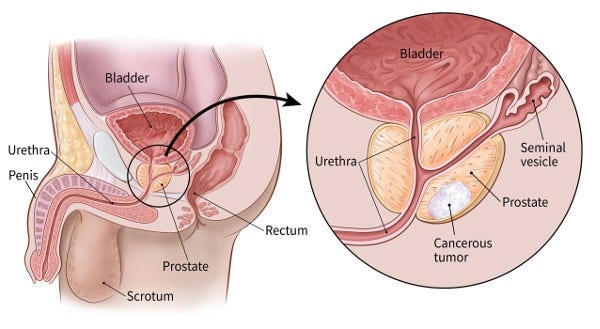List of All Services Offered By Prime Medic
List of All Services Offered By Prime Medic
List of All Services Offered By Prime Medic
List of All Services Offered By Prime Medic
List of All Services Offered By Prime Medic
List of All Services Offered By Prime Medic


The prostate is a little gland the size of a walnut, present in men just beneath the bladder. It produces seminal fluids to nourish and transfer sperm. Prostate health is important for overall wellness. Discomfort, urinary issues, or more serious complications like cancer can occur from any failure of this gland. Prostate issues are usually linked to age, but healthy lifestyle changes can lower the risk.
It is important to understand the three most common prostate conditions:
Recognizing the early signs of prostate issues is crucial for effective treatment. While many prostate conditions develop slowly, some key signals should be noted:
One of the earliest symptoms of prostate problems is a frequent need to urinate especially at night. Prostate presses against the urethra when enlarges which makes it difficult to fully empty the bladder. This leads to the sensation of needing to urinate more often even if only a small amount of urine is produced.
Men with prostate issues may experience difficulty initiating urination. This is usually due to the urethra being compressed by an enlarged prostate. This results in weak or interrupted urine flow. You might also notice a delay before urine starts to flow after you feel the urge to go.
Prostatitis is a condition in which the prostate gets infected and inflamed. It causes pain or burning during urination. This discomfort can be localised to the area between the scrotum and rectum or felt as generalized pelvic pain. Acute bacterial prostatitis can also cause flu-like symptoms such as fever, chills, and body aches.
Blood in the urine or semen is relatively rare. But it can be a sign of prostate cancer or advanced BPH. This is an alarming symptom that should prompt immediate medical attention.
Men with prostate problems may experience difficulty in erection. Prostate issues can interfere with the blood flow and nerve signals necessary for a healthy erection. While ED is also influenced by many other factors (age, cardiovascular health, and hormone levels). It can be a symptom of prostate disease.
Taking care of the prostate should be an integral part of a mans overall health plan. Here are essential tips for maintaining prostate health:
Exercise not only promotes overall well-being but also improves prostate health. Regular physical activity helps greatly in controlling weight, improving blood circulation in the body and reducing stress. Engaging in moderate aerobic exercises like walking, swimming, and cycling can have long-lasting benefits.
The primary risk factor for the development of prostate cancer and other associated disorders is obesity. You can reduce your chance of prostate issues by eating right. Exercise can also lower your risk of prostate problems.
Routine prostate tests are essential for early detection. Men over 50 or with a family history of prostate problems should take extra care.
Drinking enough water maintains urinary tract health and supports prostate function.
Excessive alcohol and caffeine can damage the prostate and bladder, leading to symptoms like soreness and excessive urination.
The key to maintaining prostate health is routine examinations. Early detection can lead to more successful treatments and a higher quality of life. You can book an appointment with a healthcare professional for screenings through PrimeMedic.
Written By
Bachelor of Medicine and Bachelor of Surgery, AMC
CEO, Founder and Chief Medical Officer at Prime Medic
Dr. Mohsin leads clinical governance and quality at Prime Medic. He works on improving digital access to evidence based medical advice and timely follow up. His aim is to help patients get clear guidance that is accurate, current, and easy to act on, no matter where they are.
View Profile